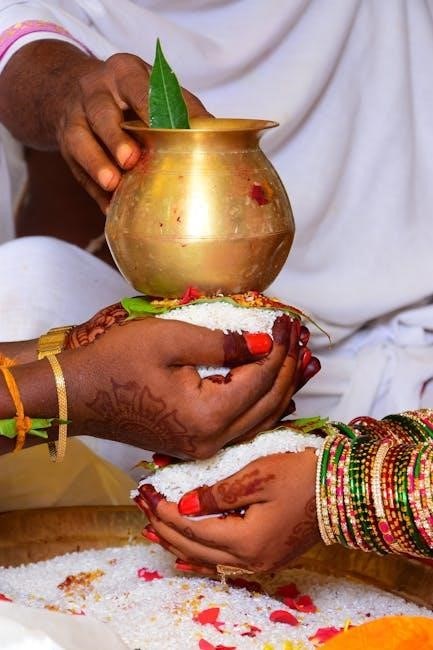Lord Venkateswara, residing at Tirumala, is a supremely revered deity․ He embodies compassion and is believed to grant devotees’ wishes, making him a central figure in Hindu worship, especially in Andhra Pradesh and Telangana․
Significance of Lord Venkateswara
Lord Venkateswara, also known as Srinivasa, is of immense significance in Hinduism, particularly in South India․ He is considered an incarnation of Lord Vishnu and the presiding deity of the Tirumala Venkateswara Temple, one of the most visited and wealthiest temples in the world․ Devotees believe that worshipping Lord Venkateswara with devotion brings prosperity, happiness, and spiritual growth․ He is revered for his compassion and ability to grant wishes to those who seek his blessings sincerely․
Importance of Ashtothram in Hindu Devotion
Ashtothrams hold a vital place in Hindu devotional practices․ They are essentially lists of 108 names of a deity, each name representing a different aspect, quality, or manifestation of the divine․ Chanting these names with devotion is believed to invoke the deity’s blessings, purify the mind, and foster a deeper connection with the divine․ The Venkateswara Ashtothram, therefore, is a powerful tool for devotees to connect with Lord Venkateswara and seek his grace through focused recitation․
“Ashtothram” is a Sanskrit term signifying “one hundred and eight names․” It is a hymn comprising 108 names of a deity, recited to invoke blessings and express devotion, central to Hindu worship practices․
Understanding the Term “Ashtothram”
The word “Ashtothram” originates from Sanskrit, combining “Ashta” (eight), “Uttara” (above or more), and “Shatam” (hundred), thus meaning “one hundred and eight․” In Hindu tradition, an Ashtothram is a sacred hymn or a devotional chant comprising 108 names of a particular deity․ Reciting these names is considered a powerful way to connect with the divine, seek blessings, and express reverence․
Venkateswara Ashtothram: Meaning and Significance
The Power of Chanting 108 Names
Chanting the 108 names in the Venkateswara Ashtothram holds immense spiritual significance․ Each name represents a unique aspect, quality, or manifestation of Lord Venkateswara․ The repetition of these names creates a powerful resonance, fostering devotion, concentration, and inner peace․ Devotees believe that sincere chanting can purify the mind, remove obstacles, and invoke the blessings of the Lord, ultimately leading to spiritual growth and fulfillment․
Venkateswara Ashtothram in Telugu
The Venkateswara Ashtothram is widely accessible in Telugu PDF format․ This allows devotees to easily read and recite the sacred verses in their native language, fostering a deeper connection and understanding․
Availability of Telugu PDF Version
Devotees seeking to connect with Lord Venkateswara through the sacred Ashtothram can readily find it in Telugu PDF format․ This digital availability ensures that the prayer is easily accessible for daily recitation and study․ The PDF version allows for convenient reading on various devices, promoting widespread engagement with this important devotional text, especially among Telugu-speaking individuals seeking spiritual enrichment and divine blessings․ Several websites offer free downloads․
Benefits of Reading in Telugu
Reading the Venkateswara Ashtothram in Telugu offers a profound connection to the divine for Telugu-speaking devotees․ Reciting the names in their native language enhances comprehension and emotional resonance, fostering deeper devotion․ Understanding the meaning behind each name amplifies the spiritual benefits, promoting inner peace and blessings․ Engaging with the text in Telugu preserves cultural heritage and strengthens the bond between devotees and Lord Venkateswara, leading to a more fulfilling spiritual experience․
Devotees can easily access the Venkateswara Ashtothram Telugu PDF through various online resources․ Many websites offer free downloads, enabling devotees to readily engage with this sacred text and experience its spiritual benefits․
Free Download Resources
Numerous websites and online platforms offer the Venkateswara Ashtothram Telugu PDF for free download, catering to devotees seeking to connect with Lord Venkateswara․ These resources provide convenient access to the sacred text, allowing individuals to easily incorporate it into their daily prayers and spiritual practices․ Many sites ensure easy access, fostering devotion and facilitating spiritual growth among Telugu-speaking devotees․
Accessing the Venkateswara Ashtothram Telugu PDF
Websites Offering PDF Downloads
Several websites dedicated to Hindu scriptures and devotional content provide free downloads of the Venkateswara Ashtothram in Telugu PDF format․ Vaidika Vignanam and Greater Telugu are examples of platforms offering this sacred text․ These websites often host a collection of spiritual literature in various Indian languages, including Telugu․ These resources allow devotees easy access to enhance their spiritual journey and understanding․
Structure and Content of the Ashtothram
The Venkateswara Ashtothram comprises 108 names, each a powerful descriptor of Lord Venkateswara․ These names highlight His divine attributes, forms, and associations, offering devotees a comprehensive way to connect with the deity through recitation․
Overview of the 108 Names
The Venkateswara Ashtothram is structured as a litany of 108 sacred names, each a unique epithet of Lord Venkateswara․ This collection, or namavali, encapsulates the Lord’s myriad qualities, divine powers, and significant roles within the cosmos․ Reciting these names is considered a potent form of worship, allowing devotees to invoke His blessings and experience spiritual elevation․ Each name acts as a key, unlocking different aspects of the Lord’s grace and wisdom, fostering a deeper connection․
Examples of Names and Their Meanings
Within the 108 names, each holds profound meaning․ For example, “Venkatesaya” signifies the remover of sins, while “Srinivasaya” denotes the abode of prosperity․ “Lakshmi Pathaye” means the consort of Goddess Lakshmi, highlighting His association with wealth and auspiciousness․ “Govinda” is another potent name, reminding us of His role as the protector of cows and the Earth․ Understanding these meanings enhances the devotional experience, transforming recitation into a meaningful contemplation of the Lord’s divine attributes, deepening the connection․
Reciting the Venkateswara Ashtothram brings spiritual upliftment and mental peace․ Devotees experience reduced stress, increased focus, and a sense of inner calm․ The sacred vibrations promote well-being, fostering a deeper connection with the divine․
Spiritual and Mental Well-being
The recitation of Venkateswara Ashtothram is believed to bestow profound spiritual benefits, fostering inner peace and mental clarity․ Regular chanting can alleviate stress, anxiety, and negative thoughts, promoting a sense of well-being and emotional stability․ It aids in cultivating mindfulness, enhancing concentration, and deepening one’s connection with the divine, leading to a more balanced and harmonious life․ The vibrations created by chanting resonate within, purifying the mind and spirit․

Benefits of Reciting Venkateswara Ashtothram
Attaining Divine Grace
Devotees believe that consistent recitation of the Venkateswara Ashtothram opens pathways to receive the divine grace of Lord Venkateswara․ Each of the 108 names encapsulates unique aspects and virtues of the Lord․ Chanting these names with devotion is considered a powerful means to invoke His blessings․ It is said to purify the chanter’s karmas, resolve obstacles, and grant fulfillment of righteous desires, ultimately leading to spiritual upliftment and a closer relationship with the divine․
How to Chant Venkateswara Ashtothram
Accurate pronunciation is key for effective chanting․ Listen to audio guides to learn the correct sounds of each name․ Maintain a steady rhythm and pace while reciting, allowing the divine vibrations to resonate within․
Proper Pronunciation and Rhythm
To chant the Venkateswara Ashtothram effectively, prioritize accurate pronunciation of each of the 108 names․ Utilizing online audio guides and resources can greatly assist in mastering the correct sounds and intonations․ Maintaining a consistent rhythm is also vital; a steady and measured pace allows the devotional energy to build, creating a powerful and immersive experience that resonates deeply, fostering a connection with Lord Venkateswara․
Creating a Devotional Atmosphere
Enhance your chanting experience by creating a serene and sacred atmosphere․ Light incense or a lamp to purify the space and invite positive energy․ Arrange an altar with an image or idol of Lord Venkateswara․ Minimize distractions by turning off electronic devices and finding a quiet location․ Focus your mind and cultivate feelings of reverence and devotion before commencing the Ashtothram for a more meaningful connection․
Venkateswara Ashtothram in Daily Life
Integrate the Venkateswara Ashtothram into your daily prayers for divine grace․ Recite it during morning or evening rituals to invoke blessings and foster a spiritual connection with Lord Venkateswara throughout your day․
Incorporating into Daily Prayers
Begin or end your daily prayers by chanting the Venkateswara Ashtothram․ This practice invites the divine presence of Lord Venkateswara into your life, fostering a sense of peace and devotion․ Regular recitation, even for a few minutes, can transform your day by providing strength, clarity, and spiritual focus․ Make it a cherished part of your routine to experience sustained blessings․
Using it for Meditation
Transform your meditation practice by incorporating the Venkateswara Ashtothram․ The rhythmic chanting of the 108 names can quiet the mind, allowing for deeper focus and spiritual connection․ Choose a quiet space, close your eyes, and let the divine vibrations of the Ashtothram guide you inward․ Regular meditation with the Ashtothram can lead to enhanced mindfulness and inner peace, nurturing your spiritual growth and well-being․

Resources for Learning Venkateswara Ashtothram
Numerous online resources offer audio and video guides for learning the Venkateswara Ashtothram․ These resources provide correct pronunciation and rhythm, aiding devotees in accurate and meaningful recitation of the sacred names․
Online Audio and Video Guides
Devotees seeking to learn the Venkateswara Ashtothram can find valuable assistance through online audio and video guides․ Platforms like YouTube and spiritual websites host recordings of the Ashtothram chanted with proper pronunciation and intonation․ These resources often display the Telugu text alongside, enabling learners to follow along visually and aurally, improving comprehension and recitation skills․ Many also offer explanations of the meanings, enhancing understanding․
Books and Texts in Telugu
For those preferring a tangible resource, numerous books and texts in Telugu contain the Venkateswara Ashtothram․ These printed materials often provide the complete list of 108 names, along with their meanings and explanations in Telugu․ Some editions may also include transliterations in other scripts and additional devotional content related to Lord Venkateswara, enriching the reader’s understanding and facilitating a deeper connection with the divine․

Cultural Significance
The Venkateswara Ashtothram holds immense cultural significance, particularly during festivals․ Recitation is common in Andhra Pradesh and Telangana, deeply interwoven with local traditions and devotional practices centered around Lord Venkateswara․
Associated Festivals and Rituals
The Venkateswara Ashtothram is integral to several festivals and rituals, especially Brahmotsavam at Tirumala․ During these auspicious occasions, the Ashtothram is chanted to invoke blessings and express devotion․ It’s also a common practice during daily worship (puja) and special ceremonies dedicated to Lord Venkateswara, reinforcing its sacred place in Hindu traditions․ The chanting adds to the festive atmosphere and spiritual experience․
Popularity in Andhra Pradesh and Telangana
The Venkateswara Ashtothram holds immense popularity in Andhra Pradesh and Telangana, where Lord Venkateswara is deeply revered․ Many families include its recitation in their daily prayers․ Temples across both states resonate with the chanting of the Ashtothram, especially during festivals․ The availability of the Telugu PDF version further fuels its widespread use, making it accessible to devotees seeking spiritual solace and blessings․

Other Languages and Translations
Beyond Telugu, the Venkateswara Ashtothram exists in Sanskrit, its original form․ English translations are available․ These versions make the prayer accessible to a wider audience, promoting understanding and devotion across linguistic barriers․
Availability in Sanskrit and English
The Venkateswara Ashtothram, while often recited and accessed in Telugu, also boasts availability in its original Sanskrit form, preserving the purity of the ancient verses․ Furthermore, recognizing the global reach of devotion, English translations are readily accessible online and in print․ This ensures that devotees from diverse linguistic backgrounds can understand and appreciate the meaning and significance of each of the 108 names of Lord Venkateswara, fostering a deeper connection with the divine․
Translations in Other Indian Languages
Reflecting its widespread devotional appeal, the Venkateswara Ashtothram extends beyond Telugu, Sanskrit, and English, with translations available in numerous other Indian languages․ These include, but aren’t limited to, Tamil, Kannada, Malayalam, Hindi, Gujarati, Bengali, and Oriya․ This linguistic diversity ensures that devotees across India can engage with the Ashtothram in a language they understand, enhancing their spiritual experience and fostering a deeper connection with Lord Venkateswara, regardless of their regional background or mother tongue․ This broad accessibility highlights the inclusive nature of the devotion․
The Venkateswara Ashtothram, with its 108 names, holds immense spiritual value․ Reciting it brings peace, divine grace, and blessings․ Its availability in Telugu PDF format ensures easy access for devotees worldwide․
The Venkateswara Ashtothram, a collection of 108 sacred names, offers numerous benefits to devotees․ Its recitation fosters spiritual growth, mental peace, and overall well-being․ The availability of the Telugu PDF version makes it accessible to a wider audience, promoting devotion and enabling a deeper connection with Lord Venkateswara․ This sacred practice provides solace and divine blessings, enriching the lives of those who engage with it sincerely and regularly, strengthening their faith․
Encouragement for Devotees
Devotees are encouraged to embrace the Venkateswara Ashtothram in Telugu, readily available as a PDF for convenient access and recitation․ Regular chanting of these 108 names of Lord Venkateswara is believed to bestow divine grace, bringing peace, prosperity, and spiritual upliftment․ Immerse yourself in the devotional practice, connect with the divine, and experience the transformative power of faith․ Let the sacred verses guide you on a path of devotion and inner harmony, enriching your life with blessings․
